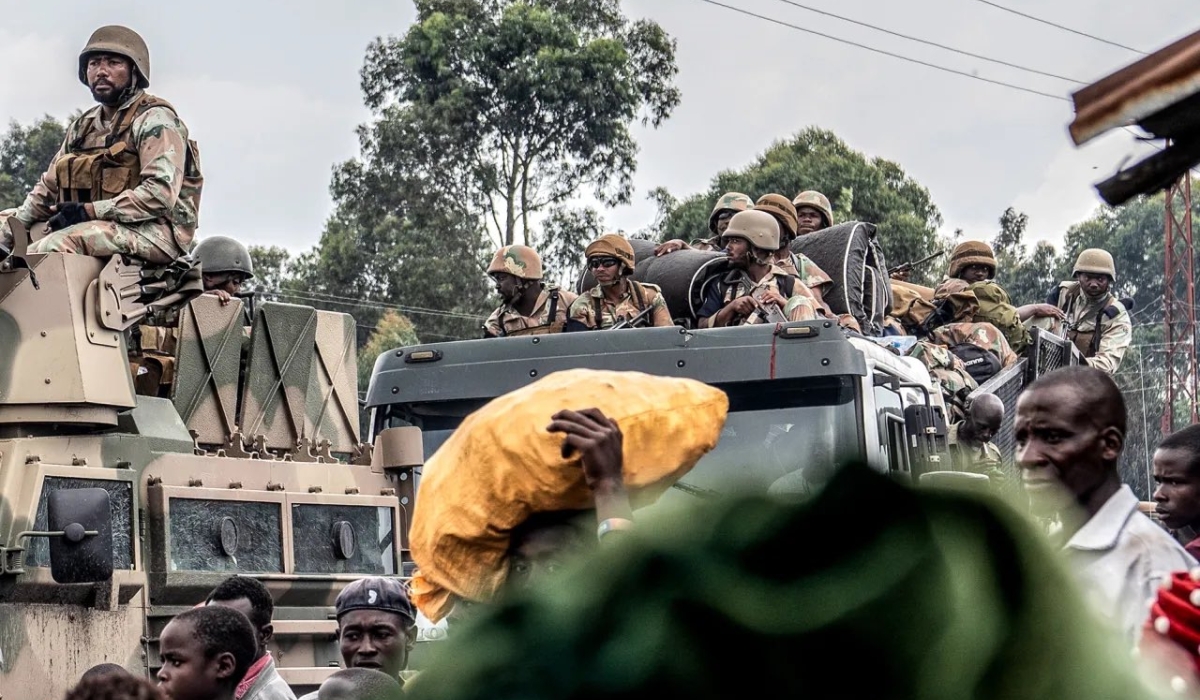
Is the departure of SADC troops imminent in eastern DR Congo?
The Southern African Development Community (SADC) held a virtual extraordinary Summit of Heads of State and Government of the Organ Troika on March 6, where it was reported that they agreed to withdraw the regional bloc’s military mission in eastern DR Congo, citing that it has become unattainable. On February 24, up to 200 SADC soldiers who had been engaged in combat in eastern DR Congo were repatriated after receiving passage through Rwanda.
Details emerging from the March 6 virtual summit are strengthening media reports indicating that South Africa, which is at the forefront of the SADC mission, is close to withdrawing its troops from eastern DR Congo.
“……. it appears that the SADC Organ Troika Plus has advised the removal of SAMIDRC soldiers and equipment from eastern DRC. According to one report, the results of this meeting are anticipated to be addressed at a forthcoming extraordinary summit of SADC heads of state and government.
The recent developments, along with statements from South Africa’s defense minister Angie Motshekga indicating that South African troops will remain until a withdrawal decision is made by SADC, have intensified reports regarding the impending withdrawal of SADC troops.
The virtual summit was led by Tanzania President Samia Suluhu Hassan, serving as the Chairperson of the SADC Organ on Politics, Defense and Security Cooperation.
Present at the event were Malawi’s President Lazarus Chakwera, Zambia’s President Hakainde Hichilema, South Africa’s Cyril Ramaphosa, and the President of DR Congo, Félix Antoine Tshisekedi. The Troika consists of three officials responsible for overseeing the political, defense, and security matters of the SADC.
The Troika aims to foster stability and collaboration within the region.
The summit was briefed on the current security situation in eastern DR Congo and discussed the defense sub-committee’s evaluation of the SAMIDRC’s mandate.
The results and suggestions from the summit will be presented at an extraordinary meeting of SADC Heads of State and Government, which will be held “soon” on a date yet to be determined. Reports from South African media indicate that the conclusion is approaching for the approximately 2,000 South African National Defense Forces (SANDF) soldiers stationed with SAMIDRC.
While their withdrawal awaits approval from the SADC, media reports indicate that steps are being taken to facilitate their exit after last week’s high-level virtual meeting.
The reports indicate that the proposed withdrawal will take place in phases; however, the specific details and timelines are still to be determined.
It remains unclear if South African troops will be able to carry all their weapons and equipment upon their departure.
In the previous month, Malawi declared its decision to withdraw its troops from eastern DR Congo.
The SAMIDRC forces, which include troops from South Africa, Malawi, and Tanzania, remain stationed at their bases within territory controlled by the AFC/M23 rebels. The rebels are controlling their movements.
The conflict involving the coalition of the Congolese government army, which includes the FDLR—a terrorist militia based in DR Congo formed by remnants of those responsible for the 1994 Genocide against the Tutsi—over 10,000 Burundian troops, 1,600 European mercenaries, South Africa-led SADC forces, and UN peacekeepers, against the M23 rebels began in 2021.
M23 has now joined a larger and rapidly growing rebel coalition known as the Alliance fleuve Congo (AFC), which was established in December 2023.
Since January, the rebels have made significant progress across North and South Kivu provinces, reclaiming large areas of territory after successfully pushing back the extensive Congolese army coalition. After intense clashes caused by ongoing breaches of a previous ceasefire by the Congolese army coalition, the rebels seized control of Goma, the capital of North Kivu Province, on January 27, and reestablished order in the area.
With the security situation in South Kivu worsening due to reports of violence, looting, and abuses by the Congolese army coalition, the rebels made their move once more. Initially, they seized the strategic airport of Kavumu, subsequently advancing south to take control of the regional capital, Bukavu, on February 15.
The rebel movement is advocating for a governance system that upholds fundamental human rights, ensures the safety of all Congolese citizens, and tackles the underlying issues of conflict. It has committed to eliminating tribalism, nepotism, corruption, and genocide ideology, along with other prevalent vices in DR Congo.
All Categories
Recent Posts
Tags
+13162306000
zoneyetu@yahoo.com



